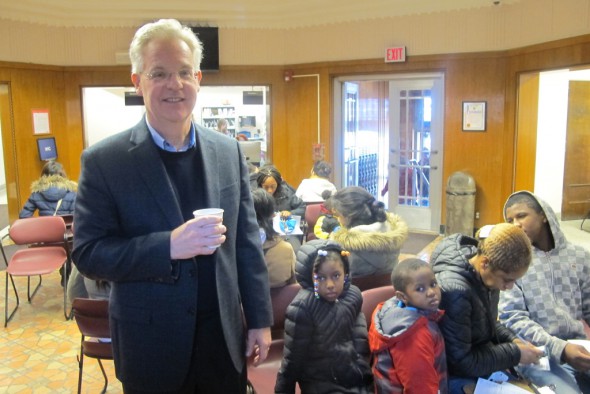Could Milwaukee Have a Measles Outbreak?
Rate of vaccination here is increasing but still not high enough to assure no outbreak occurs.

Carmeleta Harris and JaQuinn Clay wait while a Milwaukee Health Department official checks their daughter Jemiah’s immunization records on the Wisconsin Immunization Registry. (Photo by Edgar Mendez)
On a recent, bitterly cold Saturday morning, Carmeleta Harris and JaQuinn Clay sat with dozens of parents on hard plastic burgundy chairs in the lobby of the City of Milwaukee Health Department’s (MHD) Keenan Health Center, 3200 N. 36th St.
“We’re here to get our daughter immunized,” Harris said.
Alarmed by news of a national measles outbreak— 14 cases have been confirmed in Illinois — that has health officials around the country on high alert, Harris and Clay were worried when their daughter Jemiah showed up with a letter from school alerting them she was missing two shots, including the MMR vaccine for measles, mumps and rubella. Children typically receive two doses of MMR, first at 12-15 months and then at 4-6 years, according to MHD.
In Milwaukee, 89 percent of K-12th grade students have their required vaccinations, an all-time high, and 3 percentage points higher than the rate in 2013, according to Paul Biedrzycki, director of disease control and environmental health for MHD. The compliance rate at Milwaukee Public Schools is 90 percent, according to Tony Tagliavia, spokesman for the district.
The city also lags behind the state rate for immunizations, which is between 92 and 93 percent, said Biedrzycki, who added that pregnant women and children under the age of 12 months are the most vulnerable to become infected with measles, a highly contagious and sometimes deadly viral disease.
“Seeing cases in surrounding states has us taking a proactive approach to protect the community,” Biedrzycki said.
In response to the national outbreak, and also to the fact that the MPS deadline for students to get up to date on their shots was near, the city hosted two free vaccination clinics in February, one on the South Side and another at Keenan. MHD is closely monitoring the measles situation around the nation to determine if additional clinics are needed, said Sarah DeRoo, health communications officer for the city. Typically, two vaccination clinics are held annually at back-to-school fairs.
Approximately 100 people attended each of the February clinics, DeRoo said, though not all needed the measles vaccination.
A small segment of school-age children, between 1-2 percent, opt out of the shot, but are still able to attend local schools with a “personal conviction waiver,” which exempts them for medical, personal or religious reasons.

Paul Biedrzycki, director of disease control and environmental health for the Milwaukee Health Department, said a full measles vaccination confers lifelong immunity. (Photo by Edgar Mendez)
Many of those who choose not to get their children vaccinated view it as a safety issue and consider the shots dangerous, said Biedrzycki.
“About one in a million who receive the vaccine will develop an allergic reaction to it,” he said, adding that not being immunized presents a greater risk for individuals and the community as a whole.
Laurel Woods, a graduate student at Marquette University who practiced as a family physician in the state of Washington for more than 10 years, said that for most people, the memory of how bad measles can be is gone.
“They don’t think it’s a big deal,” Woods said.
According to the federal Centers for Disease Control and Prevention, one-quarter of those who contract measles will be hospitalized; one out of 1,000 will develop brain swelling that can lead to brain damage and one or two of 1,000 will die, even with the best care.
Yvonne Marquez sat in the Keenan Health Center lobby with her daughter, Antonia, and son, Santana, waiting their turn for shots.
“I watch the news so I’ve been hearing about the outbreaks,” said Marquez, adding, ”You never know what the future will bring.”
This story was originally published by Milwaukee Neighborhood News Service, where you can find other stories reporting on fifteen city neighborhoods in Milwaukee.
















